In today’s fast-paced development landscape, true efficiency isn’t optional — it’s essential. Developers deserve tools that not only streamline everyday tasks like JSON formatting, Base64 encoding, and JWT debugging, but also uphold the highest standards of data privacy. Relying on scattered online utilities disrupts workflow and exposes sensitive data to unnecessary risk. That’s why trusted professionals turn to secure, offline solutions built with developers in mind..
Enter DevUtils, a native macOS application designed to streamline these tasks by offering over 47 developer utilities in one offline, privacy-focused toolbox. Trusted by over 10,000 developers, including professionals from companies like Google and Cisco, DevUtils has become an indispensable tool for many.
With features like smart detection, customizable hotkeys, and a user-friendly interface, DevUtils enhances productivity by eliminating the need to switch between multiple tools or online platforms. Whether you’re a backend developer, frontend engineer, or data analyst, DevUtils offers a comprehensive suite of tools to simplify your daily tasks.

DevUtils Overview
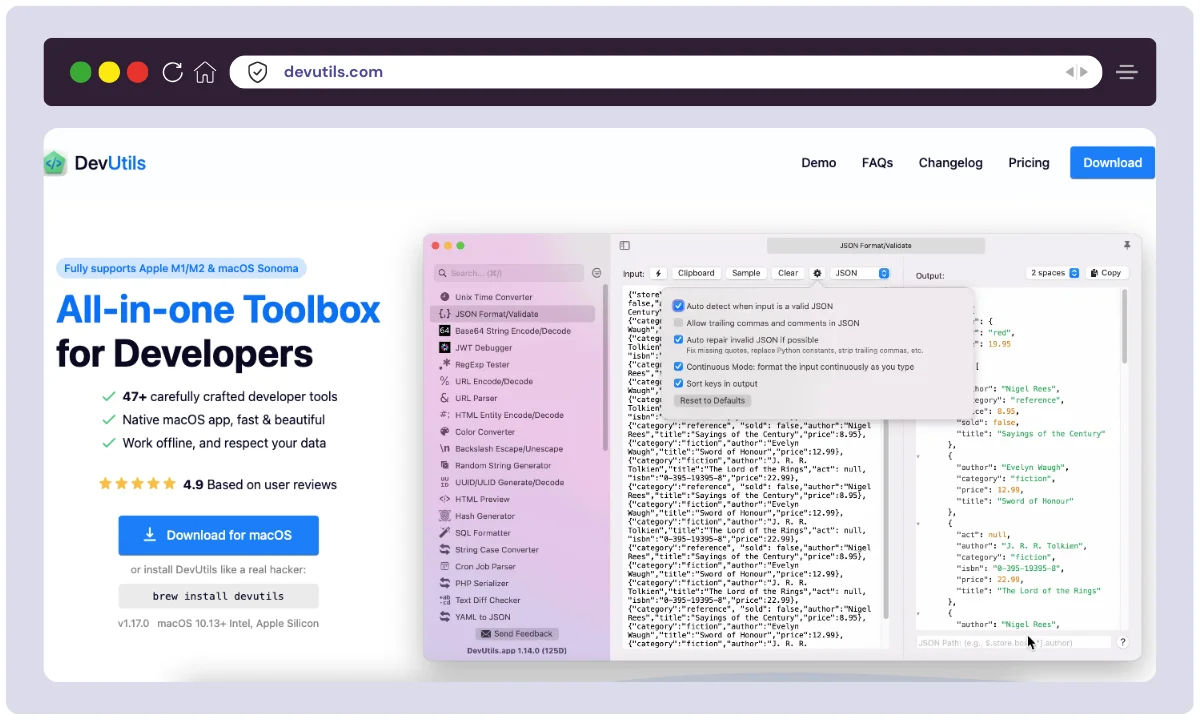
DevUtils is a macOS application created to make developers more productive by consolidating a wide array of common tools into one offline app. It was launched and is actively maintained by Tony Dinh, an indie developer and founder of DevUtils.app under Devuap LLC. The product was born out of frustration with slow and cluttered online utilities that developers often use during daily tasks like formatting JSON, decoding Base64, debugging JWTs, and more.
Since its launch, DevUtils has grown purely through word-of-mouth and user satisfaction. With a one-time payment model, developers are drawn to its offline-first philosophy, lightweight macOS-native design, and 47+ built-in utilities. It integrates with popular macOS tools like Alfred, Raycast, and Terminal, making it a seamless part of any developer’s workflow. Despite being a solo-founded product, DevUtils has earned the trust of over 10,000 developers globally and continues to receive regular updates and new features.
| Product Name | DevUtils |
| Official Website | https://devutils.com |
| Developer | Tony Dinh (Devuap LLC) |
| Launch Year | 2020 |
| Management | Solo Developer |
| USPs | Offline-first, 47+ built-in dev tools, native macOS UI |
| Category | Developer Productivity / Utilities |
| Integrations | Alfred, Raycast, Terminal, Clipboard Detection |
| Best For | macOS Developers, Indie Developers, Software Engineers |
| Support Options | Email Support, Contact Page, GitHub Issue Tracker |
| Documentation | Available on the official website |
| Company Headquarters | Sheridan, Wyoming, United States |
| Starting Price | $40 (One-time payment for 1 year updates) |
| Alternatives | DevBox, CyberChef, Postman, JSONLint, jq CLI |
| Affiliate Program | ✅ Yes |
| Affiliate Commission | Undisclosed (managed via Paddle platform) |
| Money-back Guarantee | ✅ 30-day no-questions-asked refund policy |
| Offline Availability | ✅ Fully offline with no internet required after installation |
| Mac Compatibility | macOS 10.13+ (Intel & Apple Silicon) |
| Latest Version | Regularly updated with new tools and improvements |
DevUtils was inspired by a personal need to eliminate context switching while coding—Tony built the tool he wished he had!
DevUtils Features
DevUtils packs 47+ developer tools into a single offline macOS application. These tools cover everything from data formatting and encoding to debugging and generation. Here’s a breakdown of the most essential features that make DevUtils a powerhouse for developers:
Smart Clipboard Detection
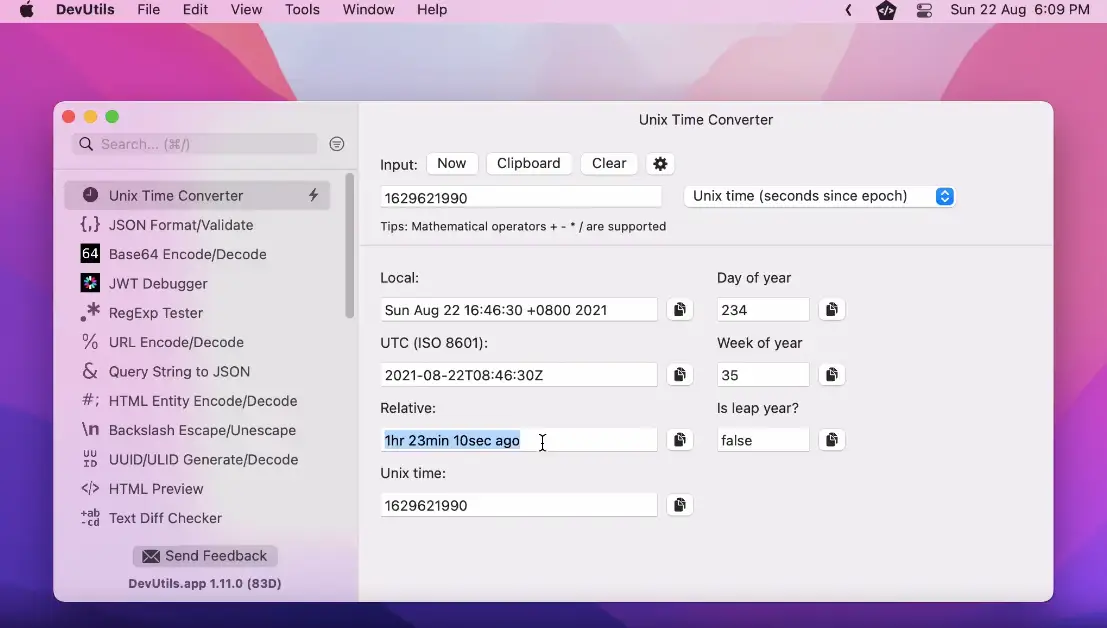
One of DevUtils’ standout features is its automatic clipboard content detection. Whenever you copy a string—be it a JSON object, JWT token, Base64 string, Unix timestamp, or even a regular expression—DevUtils instantly recognizes the format and suggests the most relevant tool.
This saves you from manually searching for the right function, significantly boosting your speed and reducing context switching. It’s like having a developer assistant that knows exactly what you need, right when you need it.
Offline-First Tools
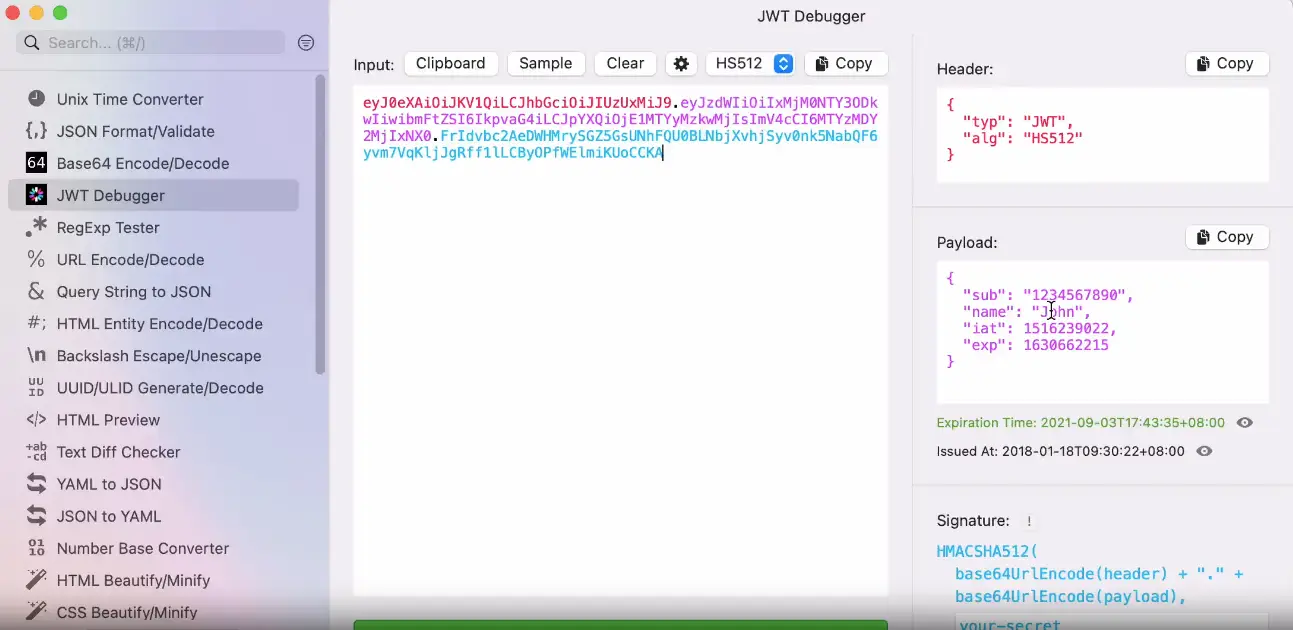
DevUtils was built with an offline-first philosophy, meaning every single one of its 47+ utilities works seamlessly without requiring an internet connection.
Whether you’re on a flight, working in a secure environment, or dealing with sensitive data, DevUtils ensures full functionality and total privacy. You no longer need to rely on ad-filled online tools that might compromise security or expose your data.
JWT Decoder
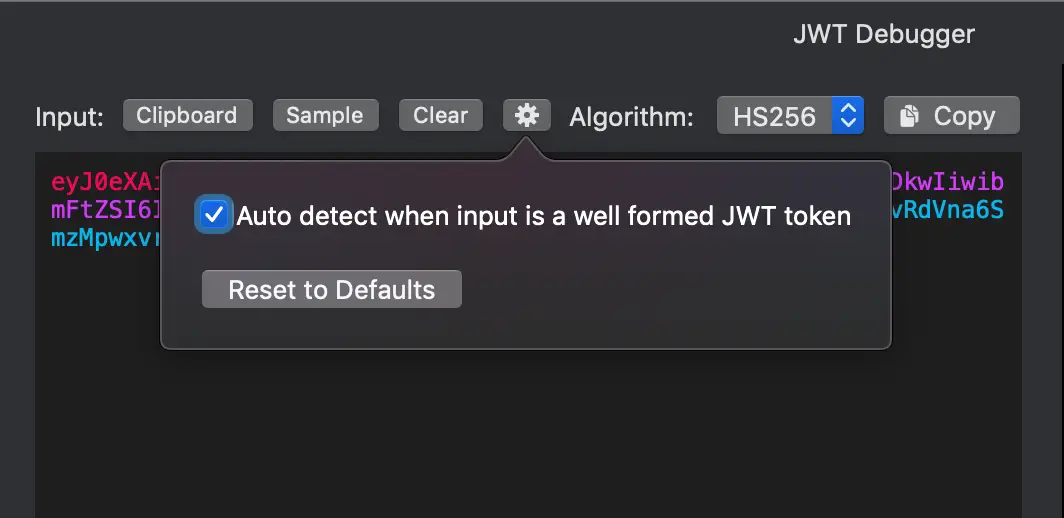
The built-in JWT (JSON Web Token) Decoder helps developers quickly parse and inspect tokens used in modern authentication systems. It splits the token into its header, payload, and signature, and presents them in a clean, readable format.
Additionally, it provides validation options to verify the signature. This is especially useful for backend developers or anyone working with OAuth2, Firebase, or custom token-based systems.
Code Beautifier & Minifier
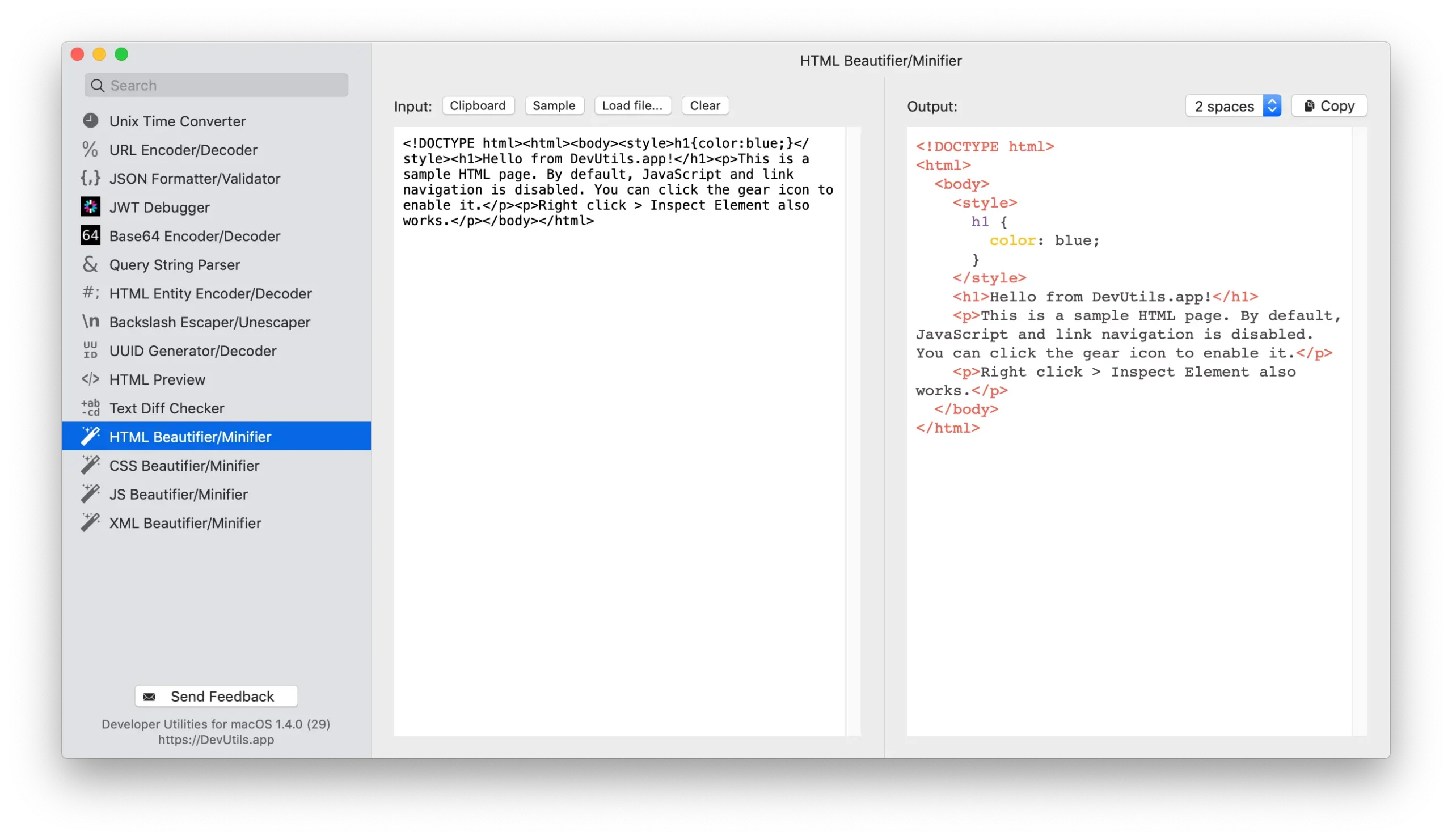
DevUtils supports code formatting and minification for multiple languages, including JSON, HTML, XML, CSS, JavaScript, SQL, SCSS, LESS, and more. With a single click, you can either beautify the code for better readability or minify it to reduce file size.
It’s a handy tool for both development and production, making it easier to debug, review, or deploy cleaner code without switching between browser-based formatters.
Hash Generators
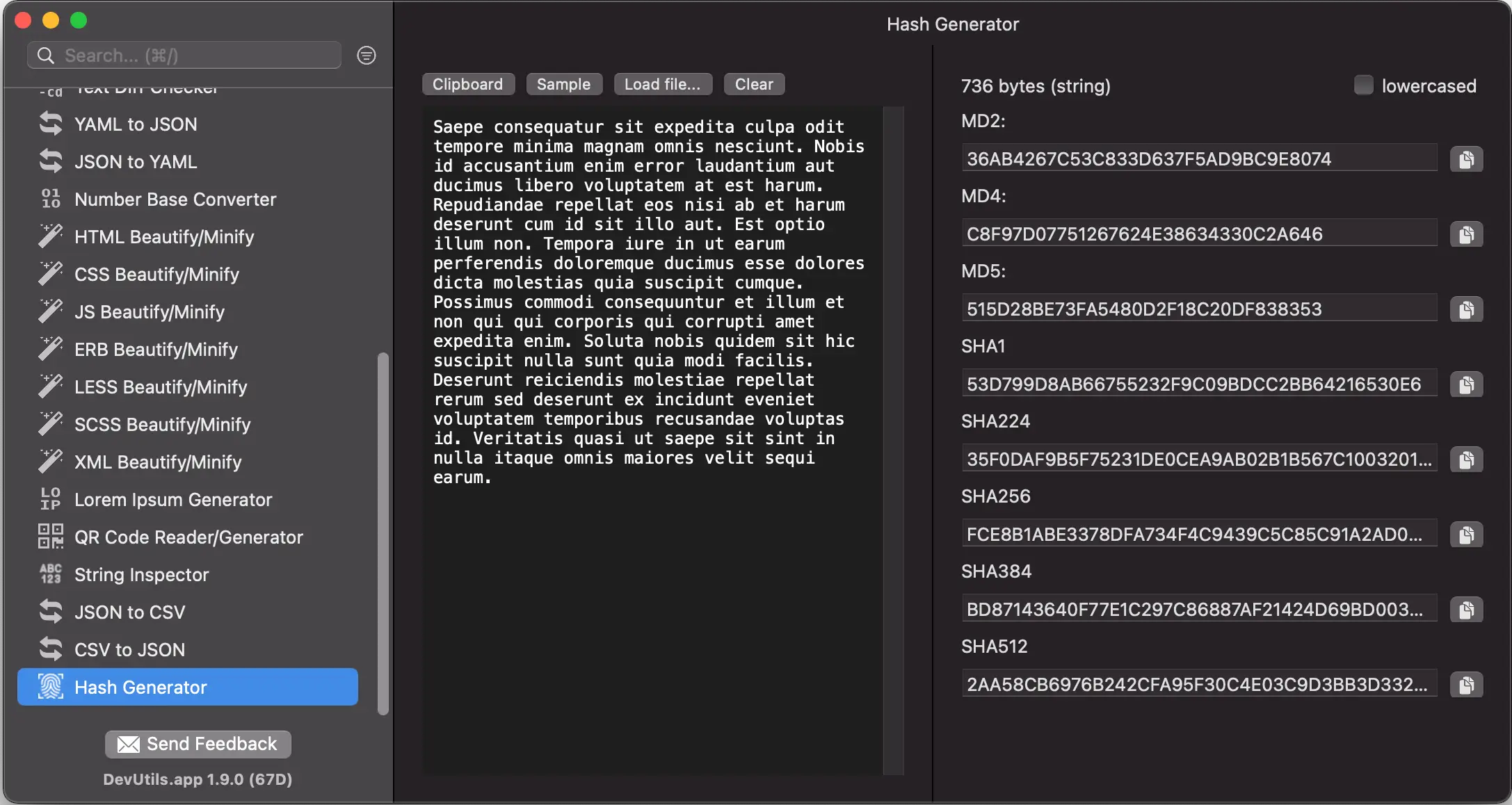
Security-conscious developers will love DevUtils’ hashing tools, which allow you to quickly generate MD5, SHA1, SHA256, SHA512, Keccak, HMAC, bcrypt, and other hash types.
These are crucial for tasks like verifying file integrity, generating secure tokens, or salting passwords. It offers customizable inputs for secret keys and message bodies, making it a reliable tool for cryptography-related work.
Timestamp Converter
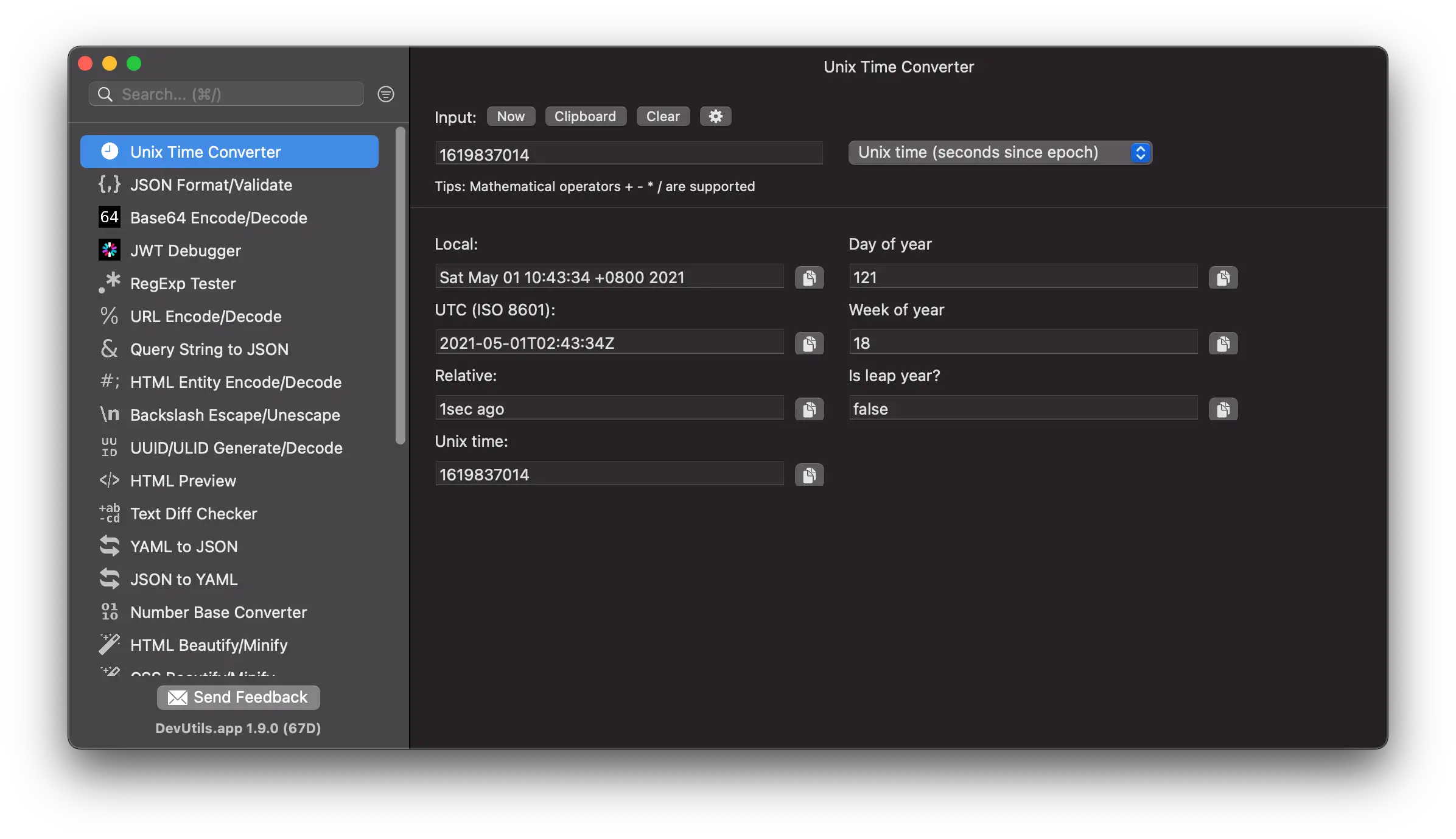
With the Timestamp Converter, you can effortlessly convert Unix timestamps to human-readable formats and vice versa. It supports both milliseconds and seconds formats and adapts to your system’s local timezone.
This feature is particularly useful when reviewing logs, analyzing backend data, or debugging time-related issues in APIs or databases.
Encoders & Decoders
DevUtils simplifies working with encoded data by providing quick access to Base64, URL, HTML, Unicode, and Hex encoding/decoding tools.
Instead of visiting separate websites for each conversion, you can perform these transformations offline in a matter of seconds. This is extremely beneficial for debugging encoded payloads or preparing data for safe transmission across systems.
String Tools & Inspectors
The app includes a variety of string utilities designed to assist with text analysis, transformation, and validation. These include a regex tester with real-time feedback, a diff checker to compare text differences, a string inspector that counts characters, lines, and words, and a random string generator for creating test data.
These tools are ideal for backend developers, data engineers, or QA testers handling dynamic string values.
Data Format Converters
Data conversion is made simple with tools that allow you to transform between JSON, YAML, and CSV formats. You can also convert query strings into JSON objects, change HTML into JSX (React-friendly format), and transform text cases (camelCase, snake_case, kebab-case, PascalCase).
This makes DevUtils a fantastic asset when you’re juggling formats between frontend and backend systems.
Diff Checker
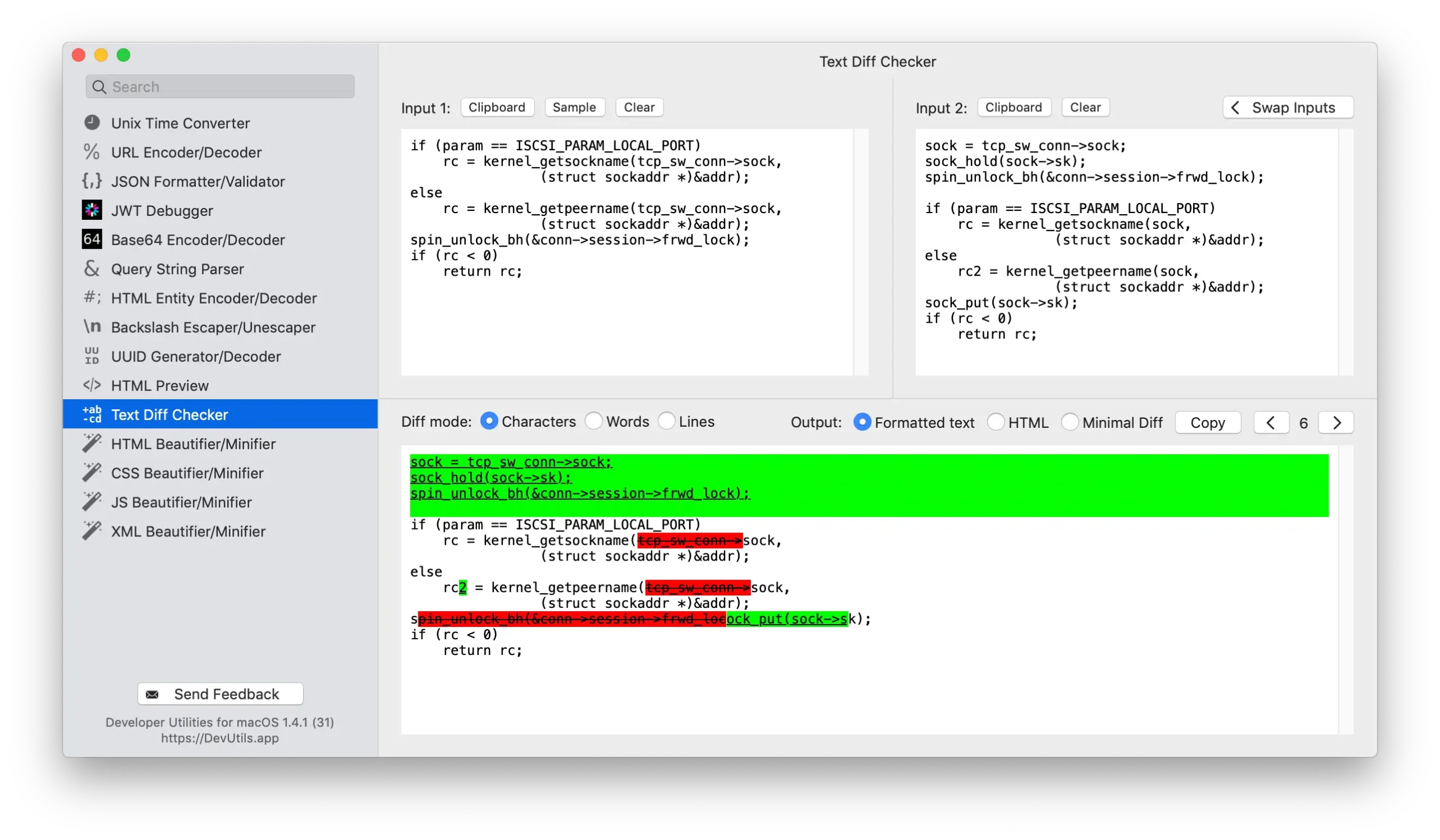
The Diff Checker lets you compare two snippets of code or text and visually highlights the differences. Whether you’re reviewing changes in configuration files, comparing logs, or verifying code updates, this tool gives you a fast and effective way to identify mismatches and inconsistencies—perfect for developers who don’t want to open a full version control system for simple comparisons.
QR Code Generator
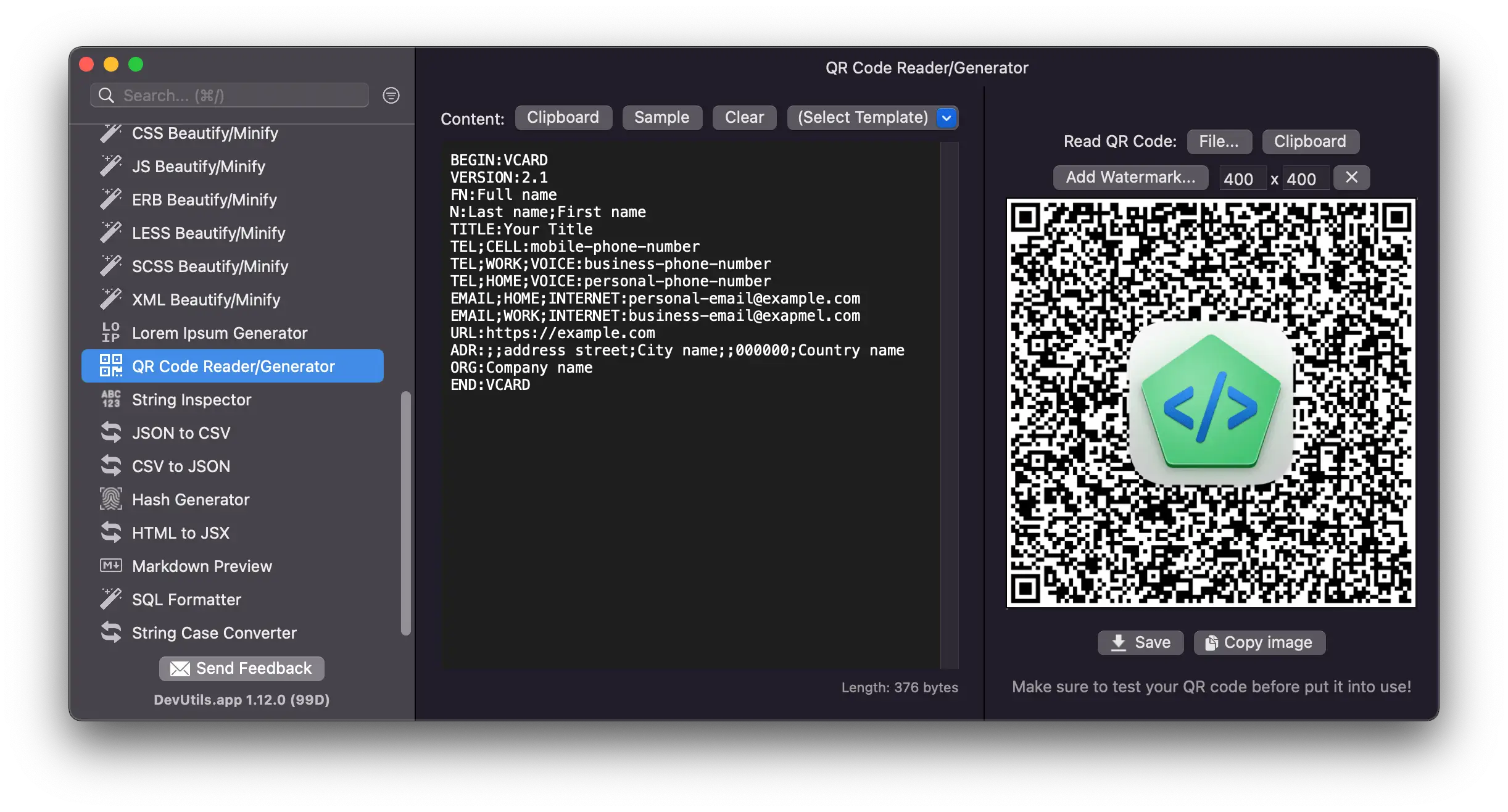
With DevUtils, you can generate QR codes instantly from any string, text, or URL. This is incredibly useful for sharing links during mobile testing, creating scan-based app triggers, or building quick access tools for demo environments. The QR codes can be copied, saved, or scanned directly from the screen.
JS & HTML Preview
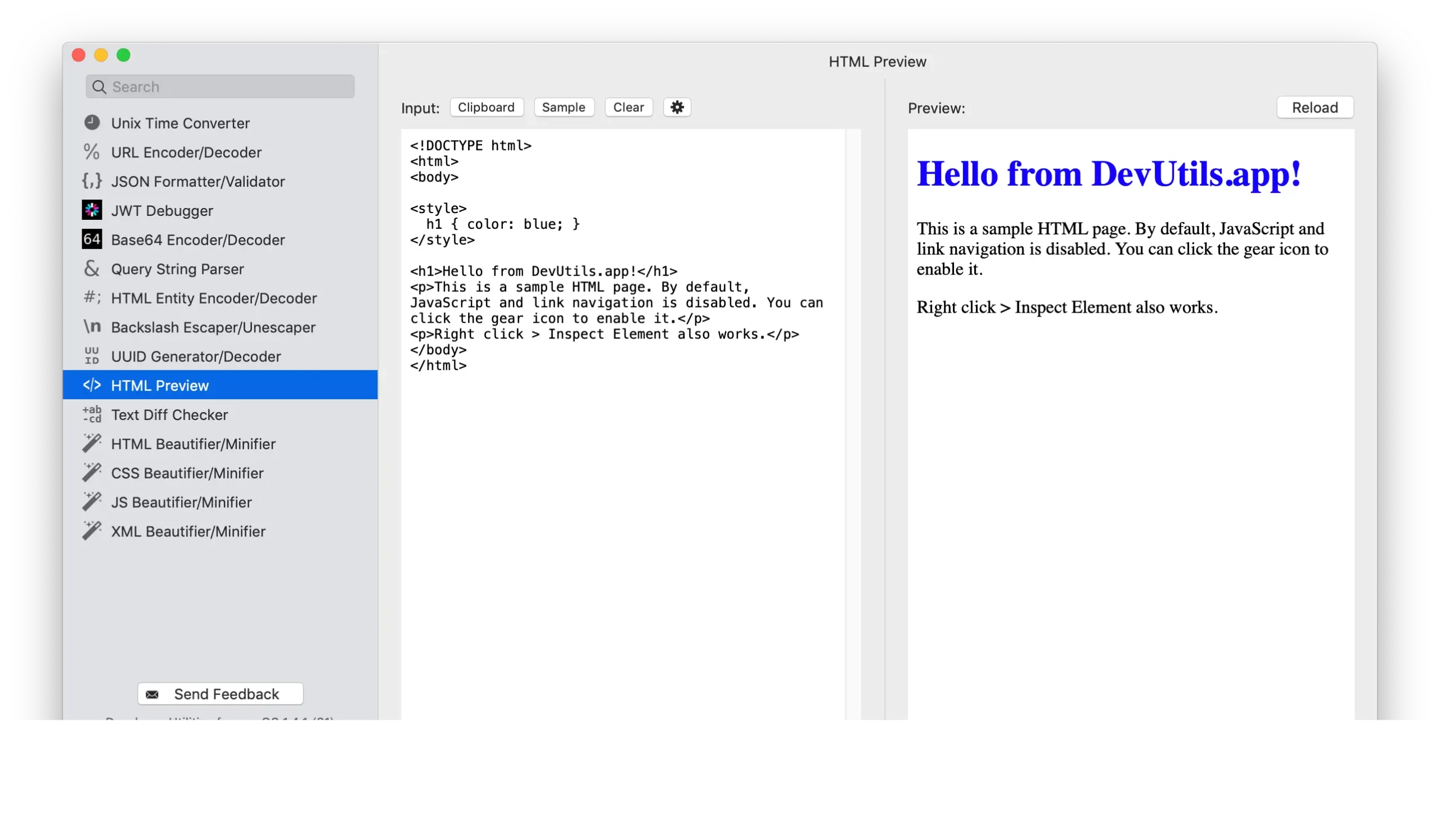
The JS and HTML Previewer allows you to write and test HTML, CSS, and JavaScript code within DevUtils. It’s a fast, lightweight sandbox for front-end developers who want to prototype ideas, test layout changes, or validate UI elements—all without launching a browser or full development server.
Terminal & Raycast Integration
DevUtils integrates smoothly with macOS automation tools like Raycast, Alfred, and the Terminal. You can launch specific utilities using commands, hotkeys, or custom scripts.
These integrations help power users and automation lovers embed DevUtils right into their everyday workflow with minimal friction.
macOS-Native UI with Dark Mode
Built using native macOS technologies, DevUtils offers a clean, responsive interface that supports both light and dark modes.
It looks and feels like a first-class Mac app, providing an intuitive user experience that blends perfectly with other macOS apps and system preferences.
Custom URL Scheme Support
Developers can use devutils:// URL schemes to trigger specific tools or actions directly from other apps, scripts, or shortcut workflows.
This makes DevUtils highly customizable and script-friendly—ideal for automating repetitive tasks or linking it with custom developer environments.
Pin & Favorite Tools
DevUtils allows you to pin your most frequently used tools to the sidebar, so they’re always accessible. This small but powerful feature enhances your productivity by minimizing the time spent searching for tools you use daily.
Multi-Window Support
Need to format JSON while hashing a string? No problem. DevUtils supports multiple tool windows, allowing you to run and view several utilities side by side. This makes it easy to multitask and compare outputs without clutter or confusion.
DevUtils offers a robust, privacy-conscious, offline toolbox tailored to boost developer productivity by eliminating the need for online searches or scattered tools.
How to Use DevUtils
Getting started with DevUtils is incredibly simple. Its macOS-native design, offline-first approach, and smart interface make it one of the easiest tools to integrate into your daily development workflow. Here’s a step-by-step guide to help you set up and use DevUtils effectively:
Step 1: Download and Install
- Visit the official site: https://devutils.com
- Download the
.dmgfile compatible with macOS 10.13 or later (both Intel & Apple Silicon supported) - Drag the DevUtils app into your Applications folder and open it
Tip: You may need to allow permissions via System Preferences > Security & Privacy if you’re opening it for the first time.
Step 2: Activate Your License
- After launching the app, go to DevUtils > License in the top menu
- Enter the license key sent to your email after purchase
- Activation is instant—your app is now fully unlocked and ready to use!
Don’t worry—once activated, you can use DevUtils offline with no internet required.
Step 3: Use Smart Clipboard Detection
DevUtils automatically detects the type of content in your clipboard.
- Copy any code or text like a JSON object, Base64 string, or timestamp
- DevUtils will suggest the appropriate tool right away via a popup
- Click the suggested tool to begin using it instantly!
This feature alone can save you hours weekly if you’re frequently debugging or formatting data.
Step 4: Manually Access Tools
- Open DevUtils
- Use the sidebar or search bar to browse through over 47 built-in tools, including:
- JSON Formatter
- JWT Decoder
- Regex Tester
- QR Code Generator
- Hash Generators
- Timestamp Converter, and many more
Pin your favorite tools to the top of the sidebar for even quicker access.
Step 5: Integrate with macOS Utilities
You can supercharge your workflow by integrating DevUtils with popular productivity tools:
- Alfred or Raycast: Use custom workflows or extensions to launch DevUtils tools directly
- Terminal: Use the
devutils://URL scheme to open specific tools from command line or scripts- Example:
open "devutils://base64"to launch Base64 encoder
- Example:
These integrations make DevUtils ideal for automation and scripting tasks.
Step 6: Customize & Multitask
- Enable dark mode or choose system theme
- Open multiple windows to use different tools side by side
- Use the Preferences menu to configure update settings, clipboard behavior, and license info
All your settings and pinned tools stay saved even after restarting the app.
Step 7: Get Help (If Needed)
- Access the Help section from the menu bar
- Visit https://devutils.com/docs for documentation
- Contact the developer directly via the website’s contact form for support or feature requests
DevUtils is developed and maintained by a responsive indie creator who regularly ships updates and listens to user feedback.
Whether you’re debugging APIs, testing tokens, converting formats, or just cleaning up code, DevUtils saves you time, streamlines your process, and keeps everything on your machine—fast, private, and efficient.
DevUtils Pricing
Choosing the right developer tool is not just about features—it’s also about value for money, flexibility, and long-term savings. Fortunately, DevUtils offers a simple, transparent, and budget-friendly pricing model tailored for solo developers, freelancers, and teams alike. With a one-time payment, you get lifetime access to all tools along with one year of free updates. There’s no subscription, no hidden costs, and absolutely no data tracking, making it one of the best-value developer utilities available for macOS.
Whether you’re working solo or managing a team, DevUtils ensures you only pay for what you need—scaling seamlessly from individual licenses to team-wide deployments. And with a 30-day money-back guarantee, there’s zero risk in trying it out.
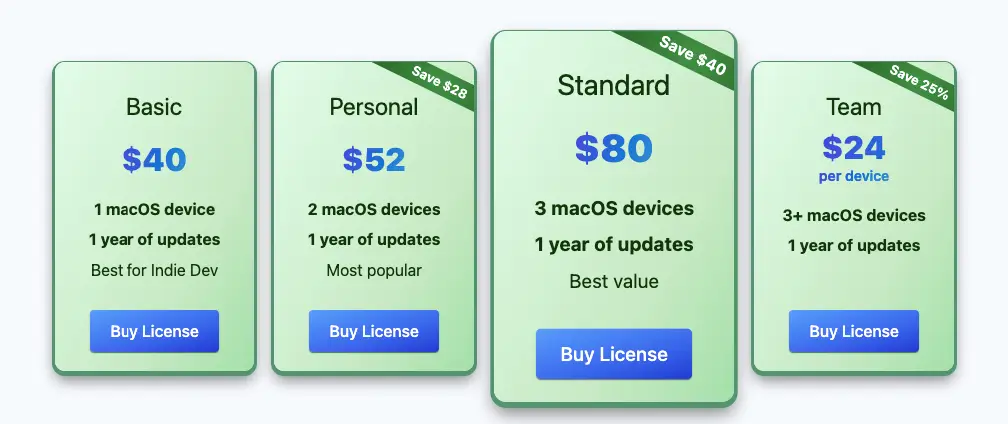
| Plan Name | Devices Covered | Price (USD) | Best For |
|---|---|---|---|
| Basic | 1 macOS device | $40 | Solo indie developers |
| Personal | 2 macOS devices | $52 | Freelancers with multiple Macs |
| Standard | 3 macOS devices | $80 | Small teams (best value!) |
| Team | 3+ macOS devices | $24/device | Larger teams and organizations |
- All plans offer a perpetual license—use the app indefinitely with one year of free updates included in the purchase.
- After the first year, updates can be renewed at a 40% discounted price, or $24 for the Basic tier, by choice—not requirement.
- There’s also a 30-day money-back guarantee on all purchases—no questions asked.
🔍 Which Plan Should You Choose?
- Solo developers: Go for the Basic plan ($40) to equip one Mac with all 47+ tools.
- Freelancers or dual-Mac users: The Personal plan ($52 for two devices) offers a better per-device deal.
- Small teams (3 people): The Standard plan (€80 for 3 devices) is the sweet spot—cheaper per person than Personal.
- Larger teams (4+ devices): Choose the Team plan at $24/device—it becomes increasingly cost-effective with volume.
Summary
- Basic: $40 for lifelong access + 1 year updates
- Personal: $52 for 2 devices
- Standard: $80 for 3 devices (best for small teams)
- Team: $24/device when buying for 3+ devices
All plans include offline tools, native macOS experience, and 30-day refund—making DevUtils a low-risk, high-reward investment for devs.
DevUtils Alternatives
While DevUtils is a powerful all-in-one offline utility for macOS developers, it’s always good to explore other tools—especially if you’re on a different operating system or need more specialized features. Whether you’re looking for a cross-platform alternative, a web-based tool, or something with collaborative features, there are plenty of other developer utilities out there that serve similar purposes.
Below is a comparison table of some of the top DevUtils alternatives, outlining key differences to help you decide what fits your workflow best:
| Tool Name | Platform | Offline Support | Key Features | Pricing | Best For |
|---|---|---|---|---|---|
| CyberChef | Web-based | ❌ No | Data encoding/decoding, hash generation, format conversion | Free | Security researchers, DevOps |
| DevBox | Windows/macOS/Linux | ✅ Yes | Local dev toolbox, JSON, encoders, regex, base converters | Free (Open Source) | Cross-platform offline devs |
| Postman | Windows/macOS/Linux | ✅ Partial | API testing, request history, token handling, collaboration features | Free + Paid Plans | Backend & API developers |
| jq (CLI) | Command Line | ✅ Yes | JSON parsing, manipulation, and filtering via command line | Free (Open Source) | Advanced users, shell scripting |
| JSONLint | Web-based | ❌ No | JSON validation and formatting | Free | Frontend & QA developers |
| Toolbox by DevToys | Windows | ✅ Yes | Offline utilities for developers (similar to DevUtils but for Windows) | Free (Windows Store) | Windows-only developers |
- CyberChef is a browser-based Swiss Army knife created by GCHQ, suitable for encryption and encoding tasks but lacks offline functionality.
- DevBox offers a solid cross-platform offline toolkit, though it lacks the Mac-native polish of DevUtils.
- Postman is ideal for API development but is much heavier and cloud-oriented.
- jq is powerful for command-line users but has a steep learning curve.
- JSONLint is perfect for quick formatting but requires internet and offers limited features.
- Toolbox by DevToys is considered the DevUtils alternative for Windows, with many of the same offline tools.
While DevUtils excels in speed, offline capabilities, and macOS integration, these alternatives can fill gaps based on your OS, team size, or specific development needs. Each tool has its strengths—so choose the one that best complements your workflow!
DevUtils Use Cases
DevUtils is not just a toolbox—it’s a daily productivity booster for developers working in various domains. Whether you’re a backend engineer, frontend developer, DevOps professional, or a QA tester, DevUtils can simplify and accelerate repetitive tasks, minimize context switching, and help you work completely offline. Here are some real-world use cases where DevUtils proves extremely valuable:
1. Formatting & Beautifying Code on the Fly
Developers often need to quickly format JSON, XML, SQL, or JavaScript during development or debugging. DevUtils provides instant formatting and minification without opening VS Code or searching online formatters.
Example: Paste a messy JSON object → DevUtils formats it instantly with color-coded indentation.
2. Decoding & Debugging JWT Tokens
Auth tokens are everywhere in modern web apps. DevUtils makes it easy to inspect JWTs, decode them securely offline, and even validate signatures—without exposing sensitive data online.
Example: Copy a token from your browser → DevUtils auto-detects and opens the JWT decoder.
3. Generating Hashes for File or Password Validation
When you need to verify file integrity or generate password hashes using MD5, SHA256, bcrypt, etc., DevUtils gives you one-click access to multiple hashing algorithms.
Example: Generate a bcrypt hash of a string to use for user authentication systems.
4. Converting Unix Timestamps During Backend Debugging
Time-based data is often stored as Unix timestamps. With DevUtils, you can convert them to readable formats instantly and vice versa, helping during log inspection or API testing.
Example: Convert a Unix timestamp into human-readable date while analyzing error logs.
5. Encoding/Decoding Data for Web Development
Need to quickly URL encode a string or decode a Base64 payload? DevUtils supports all major encoding types (Base64, HTML entities, URL, Unicode) without relying on online tools.
Example: Decode a Base64-encoded user token or encode a query string for safe web transmission.
6. Comparing Strings or Code Changes
Use the built-in diff checker to visually compare two code snippets, responses, or configuration files without setting up version control.
Example: Compare two versions of JSON configs to detect missing keys or typos.
7. Previewing HTML + JavaScript Snippets Without a Browser
Front-end developers can test and preview HTML or inline JavaScript quickly inside DevUtils. It’s lightweight and doesn’t require launching Chrome or a code editor.
Example: Test a small HTML block or modal snippet for a project without opening a full IDE.
8. Terminal & Automation Workflows
Power users can integrate DevUtils into custom scripts or workflows using its Terminal support and devutils:// URL schemes. This makes it perfect for automation, batch testing, or system integration.
Example: Launch the Base64 encoder from a terminal command during a build process.
9. Rapid Debugging with Smart Clipboard Detection
DevUtils instantly reads your clipboard and suggests tools—saving clicks and time when working with logs, tokens, configs, or structured data.
Example: Copy a timestamp or Base64 string → DevUtils suggests relevant tools without even pasting.
10. Learning & Teaching Tools
For students or mentors, DevUtils can act as a hands-on learning environment for topics like cryptography, regex, and JSON structure—making it useful in classrooms or code camps.
Example: Show how a JWT is structured or how regex captures groups, live and offline.
From quick data conversions to deep backend debugging, DevUtils is the go-to Swiss Army knife for macOS developers who value speed, privacy, and simplicity. Whether you’re coding solo or managing a team, it’s a tool that adapts to your workflow—saving you time every single day.
What Makes DevUtils Stand Out?
DevUtils truly stands head and shoulders above its competitors because of its intelligent and privacy-focused design. Unlike other offerings, DevUtils shines with its unique Smart Clipboard Detection. This feature automatically analyzes your copied content and instantly suggests the relevant tool, eliminating manual searching and dramatically speeding up your workflow. Where others may rely on web-based processing or a disjointed collection of utilities, DevUtils excels by providing a cohesive, all-in-one suite that operates entirely offline.
This offline-first approach is a significant differentiator, ensuring your sensitive data remains secure on your machine. The combination of its smart, time-saving functionality, a polished native macOS experience, and a cost-effective one-time purchase model sets a new standard for developer productivity tools. It’s not just another toolbox; it’s a seamless and intelligent assistant built to complement a developer’s natural workflow.
FAQs
Is DevUtils compatible with my macOS version?
DevUtils requires macOS 10.13 or later and supports both Intel and Apple Silicon architectures.
Can I try DevUtils before purchasing?
Yes, DevUtils offers a free version with limited tools. Additionally, it’s available through the Setapp subscription service, which offers a 7-day free trial
How does the perpetual license work?
A perpetual license allows you to use DevUtils indefinitely. You receive updates for one year, after which you can continue using the current version or renew for continued updates at a discounted rate.
Does DevUtils collect any user data?
No, DevUtils operates entirely offline and does not collect or transmit any user data.
Can I use DevUtils on multiple devices?
Yes, depending on the license purchased, you can use DevUtils on multiple devices. For example, the Personal License supports 2 devices.
Are there any discounts for teams or volume purchases?
Yes, DevUtils offers team licenses with volume discounts. For instance, a 3-device license starts at $24 per device.
How do I access DevUtils quickly?
You can set up global hotkeys or access DevUtils via the menu bar for quick tool activation.
Is DevUtils open-source?
While DevUtils is not open-source, it is developed and maintained by a single developer who is responsive to feedback and suggestions.
Can I add custom tools to DevUtils?
Currently, DevUtils does not support adding custom tools or scripts, but this feature may be considered in future updates.
Does DevUtils integrate with other applications?
Yes, DevUtils integrates with tools like Alfred, Raycast, and Terminal, enhancing its accessibility and functionality within your workflow.
Conclusion
After a thorough analysis of its features, pricing, and user experience, DevUtils emerges as a highly valuable tool for macOS-based developers in 2026. Its strength lies in consolidating a comprehensive set of essential utilities into a single, offline-first application, which not only streamlines workflows but also addresses critical data privacy concerns.
In preparing this review, we have conducted in-depth research, compared it with leading alternatives, and considered the practical needs of developers. The smart clipboard detection, intuitive interface, and one-time purchase model further solidify its position as a top-tier productivity tool.
While its macOS exclusivity is a limitation, for developers within the Apple ecosystem, DevUtils is a worthwhile investment that can significantly enhance efficiency and reduce the friction of daily development tasks.


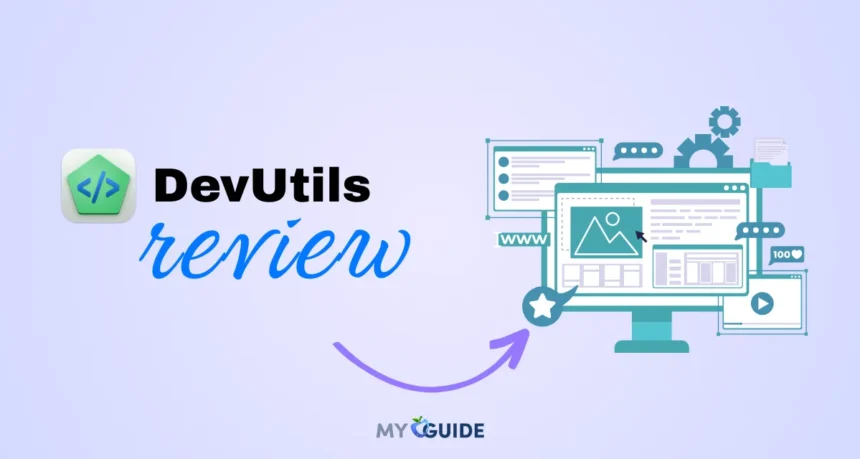




![TablePlus Review [year]: Features, Pricing, Pros & Cons](https://myappleguide.b-cdn.net/wp-content/uploads/2025/07/TablePlus-Review-Features-Pricing-Pros-Cons-150x150.webp)




